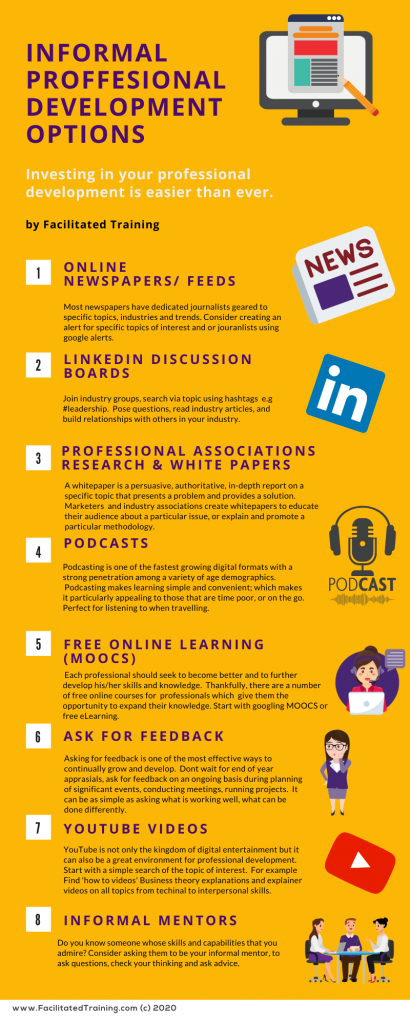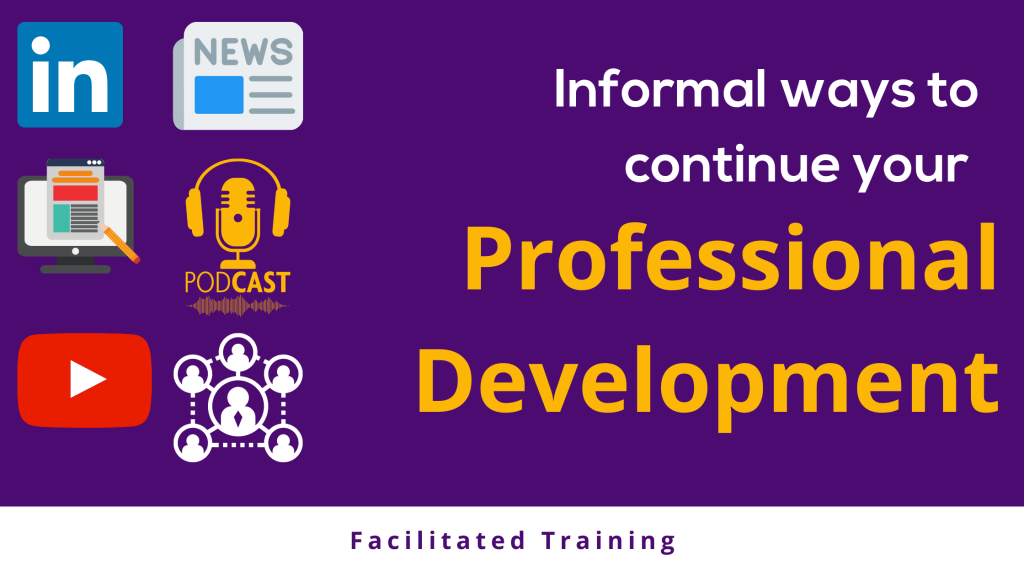Professional Development. Why you need to own it.
As more of us are independent contractors or working from home, the likelihood of attending a conference or training event will become increasingly less as the world continues to adapt to Covid19 practices. Whilst some organisations are adapting and conducting virtual conferences, the reality for many, is finding new ways to continue professional development.
Stop for a minute and reframe your thinking and understanding of professional development.
So, what is it?
According to Guskey (2000) “Professional Development (PD) is defined as the processes and activities designed to enhance professional knowledge and skills.”
PD refers to all training, certification and education that workers need to succeed in his or her career. It’s no secret that different jobs require different skills. Even if today you have the necessary skills, it is very likely that you will need additional skills in the future. For example, recent working from home changes has meant for many learning new skills such as video conferencing, shared working portals and working using cloud-based tools and resources.
What is CPD? (Continued Professional development?)
The CPD Standards organisation defines it as “Continuing professional development (CPD) is the intentional maintenance and development of the knowledge and skills needed to perform in a professional context. This could mean honing current skills, it could mean developing them to a new level, or it could mean learning new ones that will allow an employee’s job role to expand or prepare them for potential promotion.” Membership of industry bodies is often required, along with evidence that specific content or hours of professional development have occurred to maintain status and membership. An example of this is CPA for accountants.
Why invest in your own development, isn’t that what my employer is supposed to do?
There are many reasons why organisations should invest in the professional development of employees, including measurable benefits of skilled employees staying up to date with industry and tech trends. Happier, engaged employees that are less likely to leave the business. Engaged workers are more productive. Investing in employee development is a marketable asset for company brand and reputation. And the stats back this up. LinkedIn’s 2018 Workplace Learning Report found that 94% of employees would stay with a company longer if it invested in their career.
That’s all well and good, however not all workplaces budget for professional development, others may have limited budgets that restrict options such as multi-day training or conferences. And this year, budgets are being prioritised to keep doors opened and staff employed.
It’s useful to think of PD as an investment, for both you and your employer. One option is for both parties to contribute to the investment. Whilst you might be contributing time and effort your employer might be supporting you in a range of ways including accessing study leave and covering your absence or sharing part of the cost.
Reframe your thinking. You own your career. Start owning your professional development.
Return on investment for you, your workplace and career.
It’s useful to think of PD as an investment. An investment of your time and development. Applying a ‘return on investment’ mindset to planning your professional development is important because it focuses your thinking on the potential return in terms of career benefits.
In the instances where your employer is contributing by way of funding or enabling you study time they will expect a return on their investment. This could be the application of new skills back into the workplace, upskilling others or taking on more responsibility.
Plan for your development and success, by asking the following questions.
- What are the intended learning outcomes from this activity? (f the activity is a formal course this is a good question to ask the course provider).
- What is the relevance of this activity to my current work role?
- How will my employer benefit when I achieve the intended learning outcomes?
- How can I embed my new knowledge and skills?
- How will others (for example – clients, colleagues) benefit from my learning? and
- What are the longer term benefits?
A world of choices
There is a smorgasbord of continuing professional development (CPD) choices available to professionals who are willing to think creatively and analytically about their current role and career aspirations. There are three broad categories to think about:
- Formal professional development
2.Informal work-related professional development; and
- Activities external to your work that contribute to your professional development.
Formal Professional Development
Formal professional development includes:
- Full and part-time tertiary study
- Accredited and non-accredited courses, workshops, online learning, webinars (internal including internal workplace training and training from external organisations)
- Conferences and seminars (including virtual conferences, webinars)
- Undertaking research.
- Writing papers and delivering work-related presentations.
- Formally arranged mentoring which can include a ‘learning contract’.
- Workplace secondments
- Completion of online learning
There are many ‘free’ online courses available offered through universities and training providers. Like any free resource, it can take time to find the right resource for you that is relevant to your need. Many professional organisations offer access to member learning as a membership benefit.
Informal work-related professional development
Informal work-related professional development refers to other activities associated with your work which contribute to your development as a professional but are not necessarily designed as professional development
- Discussions with colleagues.
- Sharing knowledge and information at meetings.
- Participation in work-related committees.
- Internet research.
- Participation in activities associated with a professional association of which you are a member; and
- Active involvement in a professional association (CPA, Master Builders, ANIIF etc)
- Linked in discussion groups
- Business articles and association magazines
- Business and leadership texts or publications
- YouTube videos
- Listening to podcasts (these are ideal for listening to when travelling to appointments, or the workplace

Snapshot – making professional development accessible.
Taking control of your Professional Development
Your development starts and stops with you. Over time the following activities help you to be proactive and to drive your own professional development.
- Reflecting on your strengths and areas for improvement in your work.
- Listening to and acting on feedback from your manager and from colleagues.
- Being alert for professional development opportunities and assessing their relevance to your professional development needs.
- Devoting time to career planning.
Ensuring that you have discussions with your manager about professional development and the organisation’s needs. This can lead to a useful discussion about the level of support possible, i.e. the extent to which your employer is willing to invest in your professional development.
- Keeping up to date with technical developments in your area(s) of specialisation.
- Extending your knowledge into other relevant fields.
- Honing existing skills and developing new ones.
- Developing an understanding of the practical application of new skills and knowledge.
- Applying your learning and accumulating experience.
Your turn: What suggestions do you have for putting knowledge gained from your professional development activities into practice? What areas do you focus on to bring greater value and quality to your own professional development needs?
Facilitated Training has the solution that you need. Editable training materials that can be used again and again. Insert your company logo, add in case studies or examples from your workplace, or train using the quality training materials, as is.
Facilitated Training is your one-stop-shop for world-class, customisable training and professional development resources.
Facilitated Training offers training and organisational development resources to facilitators, trainers, coaches, HR managers and individuals.
Specialising in customisable leadership and management skills, Facilitated Training features a wide variety of products, including Training resources, Professional development courses, assessments, ebooks, videos and more.
Click here for customisable training materials that will assist your workplace in managing resources and output.
www.facilitatedtraining.com
About Facilitated Training’s founder and Chief Learning Officer: Colleen Condon
Colleen Condon is one of Asia Pac’s most well-rounded Organisational and Learning professionals. With her finger in every piece of the Human Resources pie, Colleen has trained 1000s of people across multiple industries and countries. She has conducted training department reviews in Soul, facilitated regional planning programs in Mumbai, deployed leadership programs across Australia, Singapore and New Zealand, to name a few.
She has developed targeted training materials for the likes of Westpac Bank, Bank of Melbourne, Sodexo, Repco and CGU Insurance. Along the way, she has written books for learning and development professionals, implemented regional online induction programs for 14 countries, and most importantly, wielded Flipchart Markers like no one else on Earth.
Colleen commenced her Learning and Development career, along the way she supplemented her practical know-how with a Grad Dip, Vocational Training (Melbourne University 1996) and Masters Educational Leadership (RMIT 2001). Her passion for the ongoing development of herself and others has included accreditation’s in Cultural Orientation Indicator (2015), People Centre Implementation (PCI) 2001, Human Synergistics, Life Style Inventory, and Myers Briggs Indicator Step ii (2004).
Most recently, Colleen was a Director of Learning Development, Asia Pacific, overseeing the development of 64,000 employees.
Her global and regional responsibilities honed her ability to work and create training materials that are adaptable across industry and culture. But she is not done yet.
Colleen’s passion is to bring engaging and lively adult centred learning to the workplace. Relevant, gamified, outcome-focused Colleen, and her team have created a range of resources that are ready to use. All of the hard work has been done, leaving you to be able to focus on getting on and developing your people.

